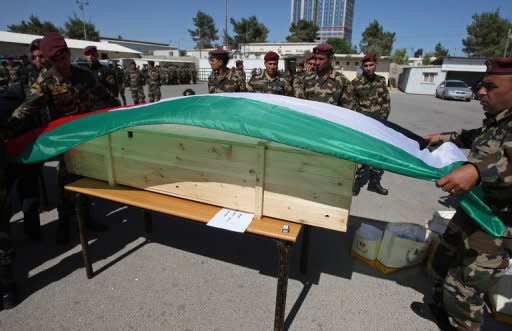Israel hands over bodies of 91 Palestinians
Israel on Thursday handed over the remains of 91 Palestinians killed during anti-Israeli attacks, some of whom died more than 40 years ago, officials on both sides said. The transfer began before dawn, when Israel formally gave the bodies to the Palestinians at a location near the West Bank city of Jericho, with 79 of them immediately transferred to Ramallah and the other 12 sent to Gaza. "At 4:00 am (0100 GMT) today, we received the remains of 91 martyrs, 79 from the West Bank and 12 from Gaza who had been buried (by the Israelis) in an inhumane and unethical fashion in numbered graves in the Jordan Valley," said Hussein al-Sheikh, head of the Palestinian general committee for civil affairs. "They will all be wrapped in a shroud and the Palestinian flag, they will be identified and have the last rites performed," he told AFP. The remains of the 79 were transferred to the Muqataa headquarters of Palestinian president Mahmud Abbas, where they were honoured with "an official ceremony and prayers for the dead," Palestinian prisoners minister Issa Qaraqaa told AFP. The remaining 12 bodies were handed to Gaza's Hamas rulers through the Erez border crossing in the early afternoon. As they were transported into the coastal territory, the dead were greeted by hundreds of people, senior Hamas officials and a guard of honour, who fired 21 shots into the air as a mark of respect, an AFP correspondent reported. The bodies were then transferred to Shifa hospital in Gaza City from where they were to be taken to the city's main mosque for funeral prayers before being buried. Several days ago, the Palestinian Authority had named the 91 "martyrs," who include eight members of a commando unit killed in March 1975 in an Israeli assault on the Savoy Hotel in Tel Aviv where they had barricaded themselves inside with hostages. Israeli public radio said the bodies included those of militants responsible for a string of suicide bombings in Jerusalem, Tel Aviv and the southern city of Beersheva. Families of the dead admitted they had conflicting emotions over the return of the bodies of their loved ones. "I have mixed feelings. I don't know what to say," said 70-year-old Mahira Misk, whose son Ezzedine was killed in clashes with Israeli troops in the West Bank city of Hebron in 2002. "I wish they had released a prisoner so he could go back to his mother alive, instead of my son who is going to return to me as a dead body," she told AFP. "But at least now I can visit his grave and read to him from the Koran." For the family of Nasser al-Buz, who had been missing since August 1989, finding his name on the list was a shock they had not expected. "We were really surprised to see my brother's name on the list of martyrs," Subhi al-Buz said of his brother, who was on Israel's most wanted list during the first Palestinian uprising from 1987 to 1993. "We always thought he was still alive somewhere," he said, adding that the family had for years asked Israel for confirmation he had been killed but had received no response. Buz founded the Palestinian Black Panthers, a military wing of Abbas's Fatah faction. "We now know Nasser's fate but the question remains -- what happened to him? How did he die and why was the occupation silent for all these years?" Israel said it hoped the gesture would build confidence between the two sides and help revive the moribund peace process, which ran aground in late 2010 in a dispute over peristent settlement building. "We hope that this humanitarian gesture will serve both as a confidence building measure and help get the peace process back on track," said Mark Regev, spokesman for Prime Minister Benjamin Netanyahu. "Israel is ready for the immediate resumption of peace talks without any preconditions whatsoever," he said in a statement. Sheikh said another handover of bodies was likely to take place in the coming weeks. "We started negotiating on a second batch, made up of 70 martyrs, and we expect to receive them next month. But there are some difficulties in the negotiations because their names and identities are not clear," he said. In July 2011, Defence Minister Ehud Barak blocked the transfer of the remains of 84 Palestinians buried in numbered graves in its "cemetery for enemy combatants" in the Jordan Valley, citing the need to review their identities.




